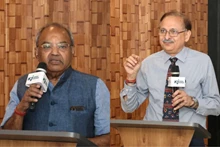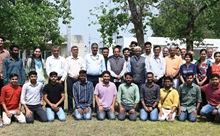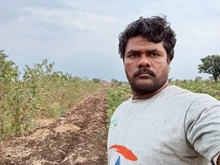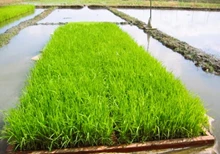
An Uruguayan delegation led by Marcos Martinez, Natural Resources Ministry of Uruguay, and Federico Condon, Genebank Manager, National Institute of Agricultural Research, Uruguay, met with an Indian delegation led by Ashwani Kumar, Joint Secretary, Ministry of Agriculture & Farmers Welfare, Government of India, as well as Dr. R.C. Agarwal, DDG (Education), ICAR, Dr. Ashok Kumar, Director, NBPGR, and Dr. Sunil Archak, Principal Scientist.
Marcos Martinez stated that their country grows millet species such as Sorghum and Finger millets, as well as a variety of minor native millets such as Paspalum and Panicum millets. Uruguay, he claims, has native grasses that grow naturally and are used for feeding animals. He stated that this native grassland is considered Uruguay's native wealth and is raised naturally as feed for cattle and sheep.
Marcos Martinez stated that they would like to investigate the possibility of two countries cooperating on germplasm exchange, grain processing for human food, and, eventually, breeding and any other research related to grain production. He stated that Uruguay is a world leader in food production. Uruguay has a population of 3.5 million people but produces enough food for more than 30 million people. He stated that they export Soyabean and its components such as oil, which are mostly GM crops, as well as long grain rice. He stated that they export meat, milk, oranges, lemons, wool, and wine produced locally. Wool and leather production is massive, and there is still a lot of room for export.
Ashwani Kumar thanked Marcos Martinez for informing him about Uruguay's export potential. He also stated that India has a large number of agricultural products that can be exported to Uruguay. He stated that India produces many vegetables and fruits and exports them to many countries, including the United States and Canada. He also stated that India exports vegetables and Basmati rice to Europe and North America worth Rs. 30,000 crores. He stated that the country grows ten different types of millets. He stated that a technical bilateral group comprised of India's Department of Agriculture, Department of Animal Husbandry, and ICAR could meet annually to advance the field of millets and any other crop or export.
He stated that Uruguay may send a letter expressing their desire to collaborate and then proceed in a planned manner. He also stated that both countries can develop a plan for mutual germplasm exchange. Both countries, he claims, can benefit from expertise in their respective countries. In the field of agriculture, he stated, Joint Working Groups (JWG) exist between India and the United States, Canada, Australia, the European Union, and similar JWGs can be formed between India and Uruguay, which can meet twice a year - once in India and once in Uruguay.
He also stated that technical cooperation between universities in both countries is possible. He stated that India has 74 agricultural universities and that our country excels in this field. A bilateral student exchange programme is another area in which both countries can collaborate. Admission of Uruguayan students to research and post-graduate programmes is also possible. According to the Uruguayan delegation, it is a fantastic idea because it fosters relationships.
According to Ashwani Kumar, both countries can collaborate on farmer rights and plant variety. India has a plant variety authority known as PPVFRA. Both countries can contribute to capacity building. He stated that the Uruguayan Embassy may send a letter expressing their interest in a bilateral agreement so that we can move forward.











